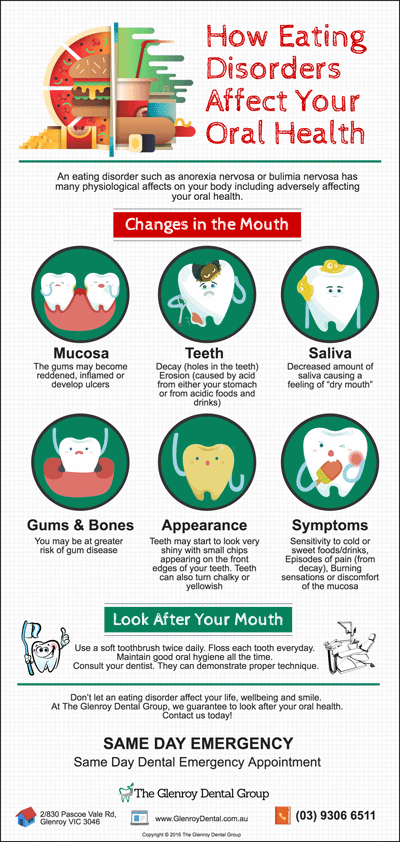Eating disorders such as Anorexia Nervosa or Bulimia Nervosa have many negative physiological effects on your body, including an adverse affect on your oral health.
How Do Eating Disorders Change Your Mouth?
- Negative effects on your gums may include reddening, inflammation, and the development of ulcers. In extreme cases, gums can recede so far that they expose the roots of your teeth to acid and to the damaging brushing action of your toothbrush.
- Eating disorders damage your teeth. Acid produced by vomiting or acidic food and drinks can cause erosion of your teeth as well as tooth decay.
- Eating disorders can cause “dry mouth”, a condition in which you have a decreased amount of saliva in your mouth. Dry mouth increases the risk of gum disease. It also increases the risk of tooth decay, as saliva both limits bacterial growth and partially cleans the mouth.
- Even gums and bones may become more susceptible to the risks of oral diseases.
- The appearance of your teeth and smile may be adversely affected by eating disorders. Teeth might become too shiny with small chips appearing on their front edges. Teeth can also change color, becoming chalky looking or yellowish.
- Physical symptoms may also develop. Eating disorders can lead to sensitivity to cold or sweet foods and drinks. Decay can lead to tooth pain. Damage to your gums may also bring a burning sensation, or general discomfort.
Look after your mouth by using a soft toothbrush twice a day, and also floss at least once a day. Maintain good oral hygiene at all times. Consult with your dentist, as they can demonstrate proper oral hygiene technique.
Don’t let an eating disorder adversely affect your smile, wellbeing, and life. At the Glenroy Dental Group, we guarantee to look after your oral health.
Contact us on (03) 9306 6511 or book your appointment online today!


